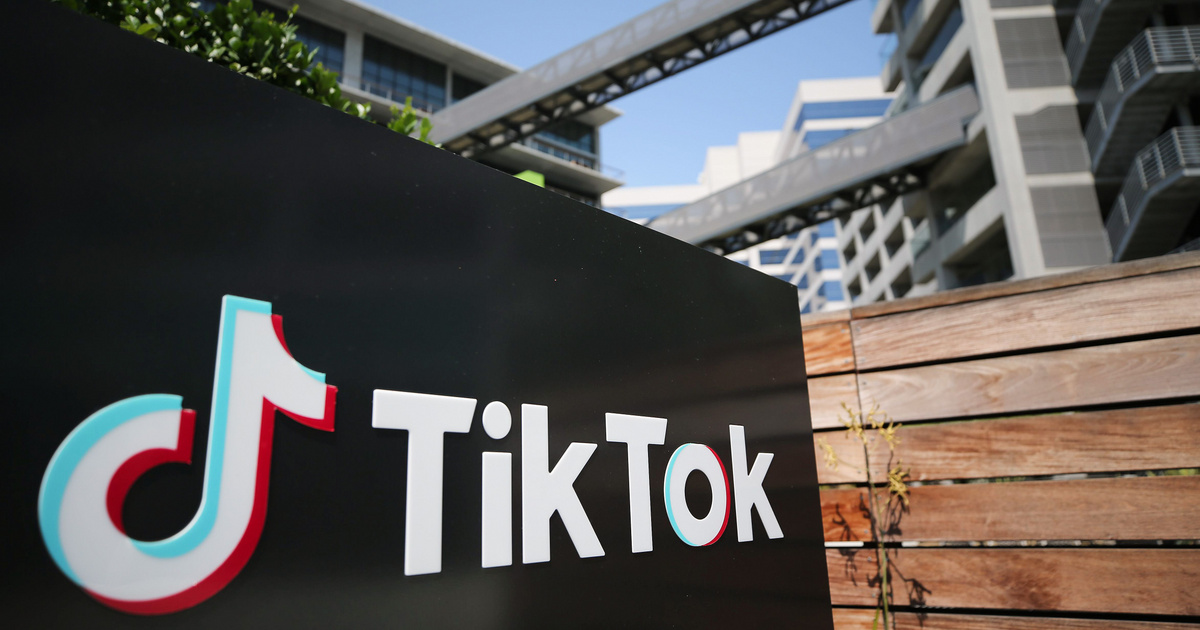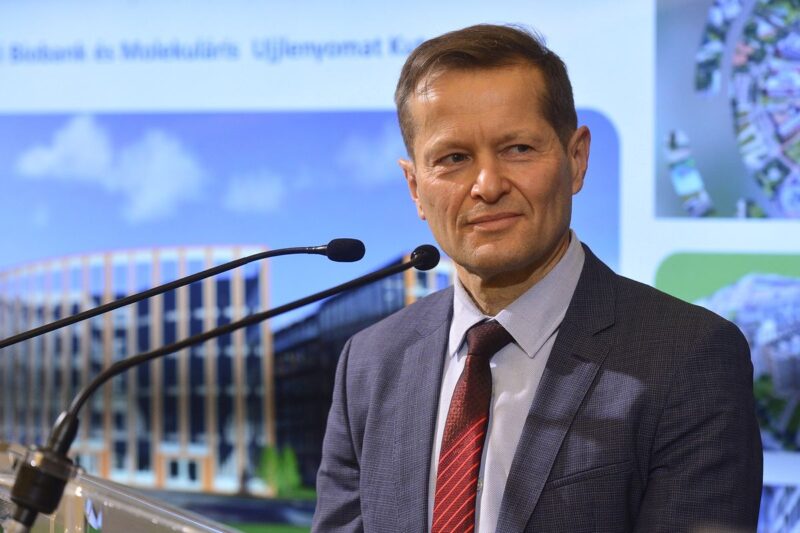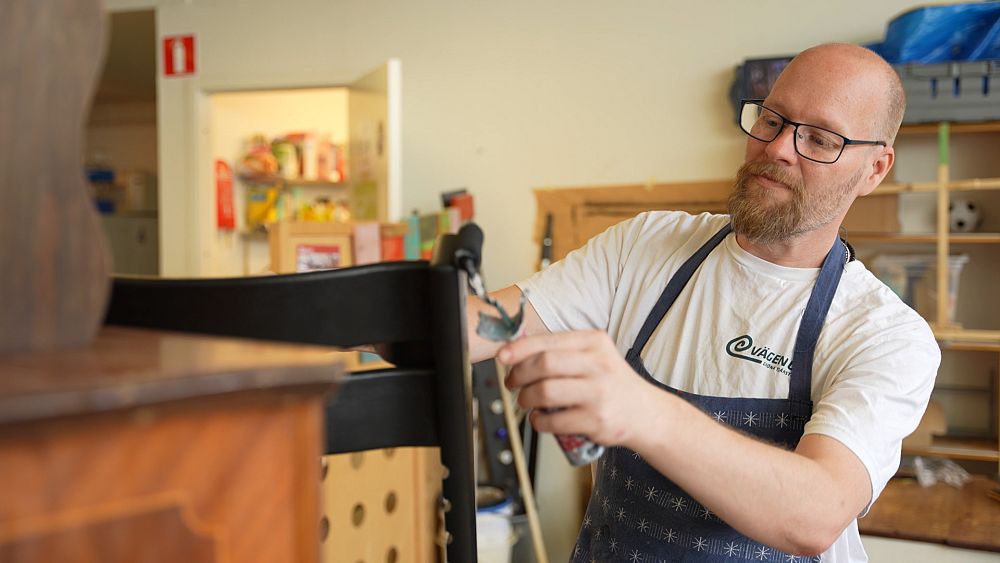When we talk about the economy, we often mention growth, profit, and shareholders. We’re in Gothenburg, Sweden’s second largest city, to learn more about another type of economy: the social economy.
Matilda, 31, loves music, art, and cats. He was unable to work for 5 years due to his health problems.
“In 2017, I studied at university, but I got burnt out and was diagnosed with burnout and depression. I got very sick all of a sudden. It was a very long way back from there,” says Matilda Hulgson, an employee at Angas Guard. “I don’t remember much of the first six months because I was so bad, I was so anxious. I was in the hospital a lot and had very difficult treatments. I love music, and I play piano and guitar at home, mostly because it’s fun. But for me it’s therapy too.” “.
Matilda gradually begins to feel better and regains her social life. His recovery has been aided by his work for the past six months at this food and event processing cooperative. Here, Matilda and others in a similar situation are offered a chance to recover.
“The positive thing about working collaboratively is that you help each other out and understand each other’s needs. In the places where you’ve worked before, it was a little weird if it was a bad day. You weren’t supposed to show how you felt. But here you’re allowed to be on.” What you are. You work as hard as you can.”
Matilda’s workplace is part of a sales organization called Social Trade. They are trying to overcome the stigma associated with social enterprises in order to build business relationships with more traditional types of companies.
“Co-operatives are a no-brainer in Sweden because they’re not really legal. But we’re getting there. I work with people who want to help others and make a real difference,” says Marie Odenbjörk, CEO of Social Trade.
There are currently 2.8 million socio-economic units operating in Europe, employing 13.6 million workers. They include cooperatives and social enterprises, and are active in almost every economic sector.
Social economy is key to the principles of the European pillar of social rights, such as equal opportunity, decent jobs and inclusion.
But the sector also faces many challenges, such as access to finance, legal barriers, and lack of visibility.
Therefore, the European Commission has adopted an action plan that focuses on three main points:
– Improving the policies and laws of member states
Opening opportunities for social economic institutions to start and grow
Increased recognition of the social economy
These measures can help the EU reach its 2030 goal of increasing job opportunities and lifting 15 million people out of poverty.
We head to the port of Gothenburg, where a social enterprise provides services to individuals and businesses, such as furniture repair and textile printing. They also operate as a work rehabilitation cooperative.
“In Sweden, many people suffer from stress-related illnesses. We have to look at health work in a different way,” says Hanna-Sara Kristensson, president of Kajskjul46.
All profits are invested directly into the company. This can sometimes make it difficult to obtain financial support.
“We can’t go to the banks and ask for a loan. So, within Sweden, there are many different projects and EU grants that we can apply for. But I think the banks still see us as a bit vague. When profit is not the main objective, they are They don’t really understand the United States.”
Social economy workers make up 4.2% of Sweden’s paid workforce. This is lower than the EU average of 6.3%, but is about halfway between Lithuania’s lowest of 0.6% and Luxembourg’s highest average of 9.9%.
I asked Giulia Gallera, an expert in the Italian social economy, about these differences.
** Julia Gallera, researcher at EURICSE
**
“Public policies are very important to enable the ecosystem, the enabling environment where social institutions can be created, developed and disseminated. There are fundamental differences between EU countries. However, in general, we can see that public policies do not recognize the amount of responsibility that social institutions take upon themselves. Frameworks The budget is very missing, it is very fragmented.”
** Brian Carter, Euronews
**
“Representatives of socio-economic organizations claim: one of the problems is access to finance. How can this be fixed?”
Julia Gallera, researcher at EURICSE
“Many social enterprises are labour-intensive organisations, and need funds to subsidize training costs, to integrate the disadvantaged, or to access public markets. I think a lot of attention has been given to financing as a means of developing social enterprises, while developing appropriate licensing policies for them would be more importance in terms of creating the necessary conditions.
** Brian Carter, Euronews
**
“Can you tell me more about the EU action plan to strengthen the social economy?”
Julia Gallera, researcher at EURICSE
“The EU Action Plan is a very important step forward. First, because it recognizes the social economy as a specific dynamic. At the same time, it clarifies the differences between the social economic entities and the main firms. It also recognizes that the social economy is not only active in specialized sectors, such as the luxury, but in all industrial ecosystems.”
The Action Plan is not binding on Member States. Thus, success largely depends on whether the EU countries are willing to implement initiatives that will allow people like Matilda to have a better future.
“I can see myself working full time in the future,” says Matilda. “I plan to go back to university and in the long run I want to be involved with the kids in some way.” “So it’s good to have hope for the future and know it’s going to work.”












































